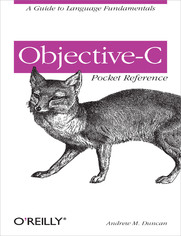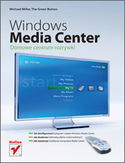Objective-C Pocket Reference - Helion

ISBN: 978-05-965-5219-0
stron: 130, Format: ebook
Data wydania: 2002-12-19
Ksi─Ögarnia: Helion
Cena ksi─ů┼╝ki: 29,67 z┼é (poprzednio: 34,50 z┼é)
Oszczędzasz: 14% (-4,83 zł)
Objective-C is an exciting and dynamic approach to C-based object-oriented programming; it's the approach adopted by Apple as the foundation for programming under Mac OS X, a Unix-based operating system gaining wide acceptance among programmers and other technologists. Objective-C is easy to learn and has a simple elegance that is a welcome breath of fresh air after the abstruse and confusing C++. To help you master the fundamentals of this language, you'll want to keep the Objective-C Pocket Reference close at hand. This small book contains a wealth of valuable information to speed you over the learning curve.In this pocket reference, author Andrew Duncan provides a quick and concise introduction to Objective-C for the experienced programmer. In addition to covering the essentials of Objective-C syntax, Andrew also covers important faces of the language such as memory management, the Objective-C runtime, dynamic loading, distributed objects, and exception handling.O'Reilly's Pocket References have become a favorite among programmers everywhere. By providing important details in a succinct, well-organized format, these handy books deliver just what you need to complete the task at hand. When you've reached a sticking point in your work and need to get to a solution quickly, the new Objective-C Pocket Reference is the book you'll want to have.
Osoby które kupowały "Objective-C Pocket Reference", wybierały także:
- Biologika Sukcesji Pokoleniowej. Sezon 3. Konflikty na terytorium 124,17 zł, (14,90 zł -88%)
- Windows Media Center. Domowe centrum rozrywki 66,67 zł, (8,00 zł -88%)
- Podręcznik startupu. Budowa wielkiej firmy krok po kroku 93,13 zł, (14,90 zł -84%)
- Ruby on Rails. ─ćwiczenia 18,75 z┼é, (3,00 z┼é -84%)
- Scrum. O zwinnym zarz 78,42 zł, (14,90 zł -81%)
Spis tre┼Ťci
Objective-C Pocket Reference eBook -- spis tre┼Ťci
- Objective-C Pocket Reference
- 1. Objective-C Pocket Reference
- 1.1. Introduction
- 1.1.1. Typographic Conventions
- 1.1.2. Acknowledgments
- 1.2. What Is Objective-C?
- 1.2.1. Dynamic Dispatch
- 1.2.2. Dynamic Typing
- 1.2.3. Dynamic Loading
- 1.2.4. Which Objective-C?
- 1.2.5. How Do I Get Started?
- 1.3. Elements of the Language
- 1.3.1. Objects
- 1.3.2. Classes
- 1.3.2.1. Declaring an interface
- 1.3.2.2. Implementing a class
- 1.3.3. Inheritance and Subtyping
- 1.3.4. Fields
- 1.3.4.1. Access modifiers
- 1.3.5. Methods
- 1.3.5.1. Declaring a method
- 1.3.5.1.1. No parameters
- 1.3.5.1.2. One parameter
- 1.3.5.1.3. More than one parameter
- 1.3.5.1.4. A variable number of parameters
- 1.3.5.2. Implementing a method
- 1.3.5.3. Calling a method
- 1.3.5.4. Naming collisions
- 1.3.5.5. Private methods
- 1.3.5.6. Accessors
- 1.3.5.7. Message search paths
- 1.3.5.8. Special receivers
- 1.3.5.9. Selectors
- 1.3.5.1. Declaring a method
- 1.3.6. Categories
- 1.3.6.1. Declaring a category
- 1.3.6.2. Implementing a category
- 1.3.7. Protocols
- 1.3.7.1. Declaring a protocol
- 1.3.7.2. Adopting a protocol
- 1.3.7.3. Checking for conformity to a protocol
- 1.3.7.4. Informal protocols
- 1.3.8. Declarations
- 1.3.8.1. Dynamic typing
- 1.3.8.2. Static typing
- 1.3.8.3. Type qualifiers
- 1.3.9. Predefined Types, Constants, and Variables
- 1.3.9.1. Types
- 1.3.9.2. Constants
- 1.3.9.3. Variables
- 1.4. Compiler and Preprocessor Directives
- 1.4.1. Class Declarations and Definitions
- 1.4.2. Forward Declarations
- 1.4.3. Expanding Directives
- 1.4.3.1. Using @encode
- 1.4.3.2. Using @defs
- 1.4.3.3. Using @"string
- 1.4.4. Preprocessor Symbols
- 1.5. Compiler Flags
- 1.6. Remote Messaging
- 1.6.1. Pointer Parameter Qualifiers
- 1.6.2. Return Value Qualifiers
- 1.6.3. Object Qualifiers
- 1.7. Object Lifecycle
- 1.7.1. Creating an Object
- 1.7.1.1. Calling creation methods
- 1.7.1.2. Writing creation methods
- 1.7.1.3. Sample code for initialization
- 1.7.1.4. Initializing classes
- 1.7.2. Copying an Object
- 1.7.2.1. Calling copy methods
- 1.7.2.2. Writing copy methods
- 1.7.3. Deallocating an Object
- 1.7.3.1. Calling deallocation methods
- 1.7.3.2. Writing deallocation methods
- 1.7.1. Creating an Object
- 1.8. Runtime Errors
- 1.8.1. Object Error Handling
- 1.8.2. Exceptions in Cocoa
- 1.8.2.1. Keywords for handling exceptions
- 1.8.2.2. A Cocoa exception handling example
- 1.9. Runtime Environment
- 1.9.1. Class Objects
- 1.9.2. Metaclass Objects
- 1.9.3. Selectors
- 1.9.4. Protocol Objects
- 1.10. Root Classes
- 1.10.1. Fields
- 1.10.2. Methods
- 1.10.3. The Object Class
- 1.10.3.1. Creating, copying, and freeing objects
- 1.10.3.2. Identifying objects and classes
- 1.10.3.3. Testing object type
- 1.10.3.4. Testing inheritance and conformance
- 1.10.3.5. Information about methods
- 1.10.3.6. Sending messages
- 1.10.3.7. Posing
- 1.10.3.8. Enforcing intentions
- 1.10.3.9. Error handling
- 1.10.3.10. Archiving
- 1.10.4. The NSObject Class
- 1.10.4.1. Creating, copying, and freeing objects
- 1.10.4.2. Identifying objects and classes
- 1.10.4.3. Testing inheritance and conformance
- 1.10.4.4. Information about methods
- 1.10.4.5. Sending messages
- 1.10.4.6. Posing
- 1.10.4.7. Error handling
- 1.10.4.8. Archiving
- 1.10.4.9. Reference counting
- 1.11. Forwarding Messages
- 1.11.1. Object Forwarding
- 1.11.2. NSObject Forwarding
- 1.12. Memory Management
- 1.12.1. Manual Memory Management
- 1.12.2. Reference Counting
- 1.12.2.1. Maintaining an objects reference count
- 1.12.2.2. Creating a new object
- 1.12.2.3. Receiving an object from another scope
- 1.12.2.4. Returning an already-stored object
- 1.12.2.5. Replacing an already-stored object
- 1.12.2.6. Deallocating an object
- 1.12.2.7. Retain cycles
- 1.12.3. Garbage Collection
- 1.13. Archiving Objects
- 1.13.1. Archiving Descendants of Object
- 1.13.2. Archiving Descendants of NSObject
- 1.14. Key-Value Coding
- 1.14.1. Access Permissions
- 1.14.2. NSKeyValueCoding Methods
- 1.14.3. Handling Key Lookup Failures
- 1.15. Optimizing Method Calls
- 1.16. Objective-C++
- 1.17. Objective-C Resources
- 1.1. Introduction
- Index
- About the Author
- Copyright





